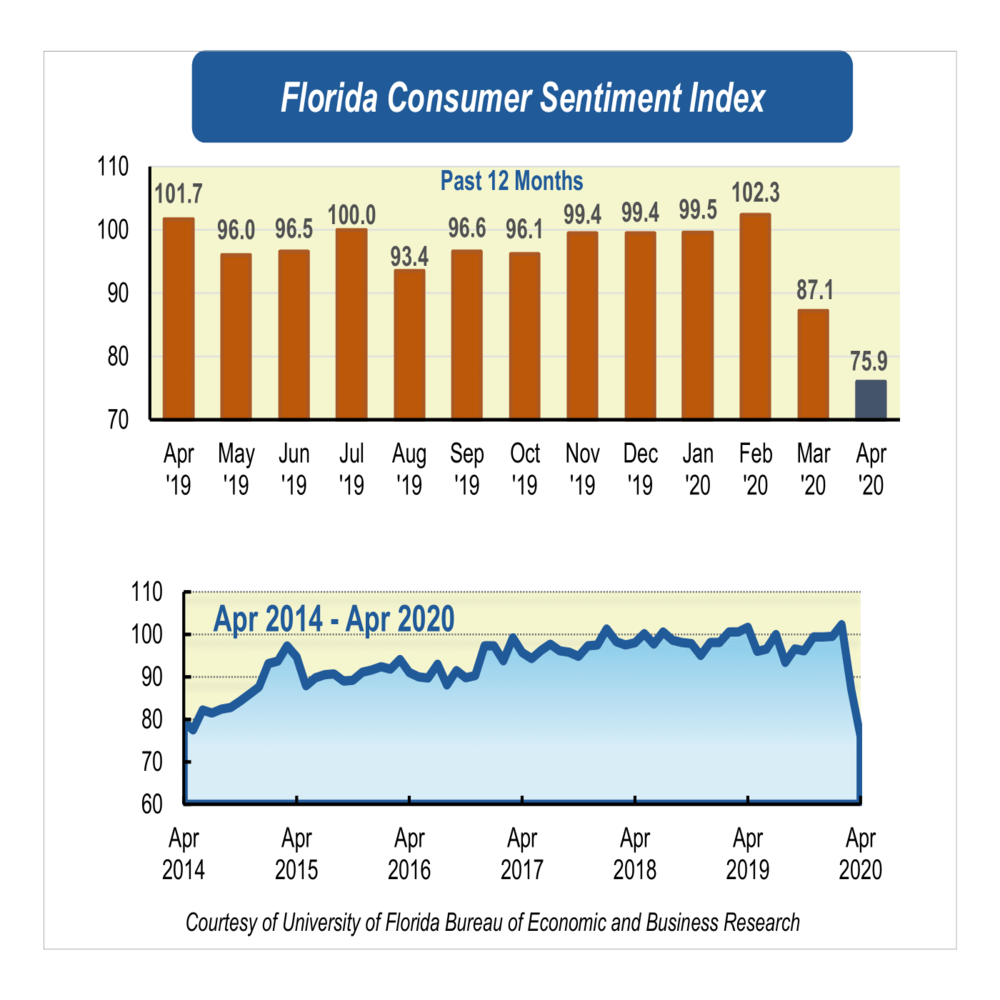
April’s consumer sentiment continues freefall amid COVID-19 pandemic
Consumer sentiment in Florida took a second nosedive in April, plummeting 11.2 points to 75.9 from a revised figure of 87.1 in March. Similarly, national consumer sentiment declined sharply for a second consecutive month.
“The continued decline in consumer confidence comes as no surprise as large sectors of the economy have remained paralyzed and an increasing number of workers are being furloughed following the efforts to contain the pandemic,” said Hector H. Sandoval, director of the Economic Analysis Program at UF’s Bureau of Economic and Business Research.
All five components that make up the index decreased.
Floridians’ opinions of their personal finances now compared with a year ago decreased 10.9 points from 84.5 to 73.6. Opinions as to whether now is a good time to buy big-ticket item like an appliance or a car showed the greatest decline in this month’s reading, plummeting 28.7 points from 76 to 47.3. Both downward readings were shared by Floridians across all sociodemographic groups; however, women reported slightly more pessimistic views.
Similarly, the three components corresponding to Floridians’ expectations about future economic conditions also declined in April. Expectations of personal finances a year from now fell slightly three-tenths of a point from 99.4 to 99.1. Expectations about the U.S. economic conditions over the next year dropped 8.1 points from 80 to 71.9. The outlook of U.S. economic conditions over the next five years decreased 7.7 points from 95.5 to 87.8. These downward readings were also shared by all Floridians without exception.
“Both short- and long-run expectations about the U.S. economy reflect a pessimistic economic outlook, suggesting a longer, U-shaped recovery from the current economic downturn,” Sandoval said. “Since mid-March, over 1.15-million Floridian workers have applied for unemployment benefits, 11.2% of the slightly more than 10 million workers in the labor market, and forecasts a surge in Florida’s unemployment rate in the short-run.
“Most of the pessimism in April stems from Floridians’ views about current economic conditions, particularly from opinions as to whether now is a good time to buy a big-ticket item. When income declines and consumers are more concerned about the economy, they tend to postpone the purchase of big-ticket items. Notably, this component of the index reached its lowest level in record since the series began tracking confidence in 1985.”
As an economy based on tourism, Florida’s economic prospects have been severely affected by the measures to contain the virus. Looking ahead, Sandoval said he expects consumer confidence to drop at a slower pace in the coming months as it is unclear when all the sectors of the economy will return to normal. Although consumer confidence has not reached the levels observed during the depths of the Great Recession, he said, the index is 17.1 points away from the record low of 58.8 registered in June 2008.
Conducted April 1-23, the UF study reflects the responses of 323 individuals who were reached on cellphones, representing a demographic cross section of Florida. The index used by UF researchers is benchmarked to 1966, which means a value of 100 represents the same level of confidence for that year. The lowest index possible is a 2, the highest is 150.
Details of this month’s survey can be found at https://www.bebr.ufl.edu/sites/default/files/csi/csi_2020_28_april.pdf.
